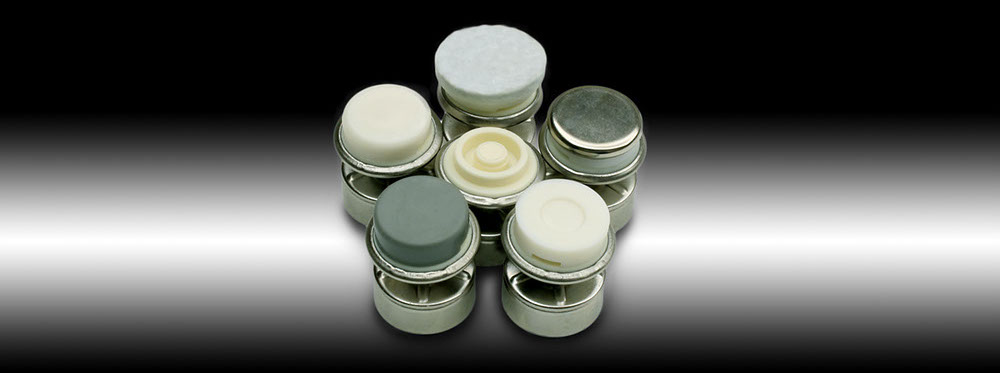Guide for Selecting
School Furniture Glide Bases
There are many styles and types of glides and bases offered on school furniture and for replacement of worn or damaged school furniture glides.
Different base styles and materials can dramatically impact performance depending on the flooring surface. While the correct choice of glide base can positively impact maintenance costs and function, the wrong choice can be very costly and cause floor damage.
Typically, the most common floor surfaces found in schools are VAT (vinyl/asbestos tile), VCT (vinyl composite tile), ceramic tile, wood and carpet. Each flooring surface has distinct strengths and weaknesses that call for different furniture glides that offer unique performance characteristics. Here is a brief discussion of the various glide bases that are available and their general applicability to different flooring surfaces
Click on a heading to advance to the appropriate section:
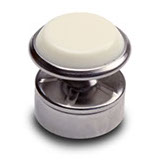 Nylon Base Glide
Nylon Base Glide
By far the most popular furniture glide base, nylon bases are strong, economical, durable and somewhat universal, able to be used on almost all floor surfaces. The biggest problem with nylon base furniture glides is that over time, dirt and sand become embedded into the nylon base and on softer flooring, such as VCT tile or wood, the nylon base with dirt embedded in it can become very abrasive and damage the floors. This can surely be prevented with diligent floor maintenance. But many times, schools do not have the resources to devote to constant floor maintenance and this is when floor damage can occur. Another drawback from nylon base furniture glides is that when students slide chairs across the floor, the chair has the tendency to be quite noisy which some find annoying and disruptive.
back to top
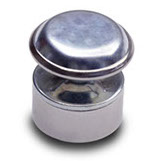 Steel Base Glide
Steel Base Glide
Steel base furniture glides are usually more expensive than nylon base furniture glides but are less likely to cause permanent floor damage in poorly maintained floors. Because the steel base itself is very hard, the dirt and grit on the floors can not imbed into the base, reducing the damaging effect nylon base glides can have. However, on waxed VCT tile floors, steel bases have the tendency to create unsightly black streaks on the tile which many find objectionable. These black streaks usually can be removed by stripping and re-waxing but this is an expensive and tedious process to perform properly. Also, because the steel base can rust when exposed to wet conditions for long periods of time, some schools who use steel base furniture glides on carpet which is cleaned regularly opt not to use steel bases, especially if the furniture will be placed on the wet carpet soon after cleaning.
back to top
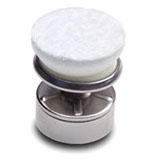 Felt Base Glide
Felt Base Glide
Felt base glides provide an attractive alternative to standard glide bases. Felt is a much softer medium than conventional furniture glide base materials and therefore provides a softer cushioned feel for the furniture. Chairs with felt base glides will slide easily and silently across the floor. This is very attractive to teachers and administrators who want to reduce noise in the classroom and create a better learning environment. Surely felt can help achieve this. Also felt base glides can slide across the floor without causing scratching or marring. However all of these benefits from felt base glides can be temporary. Over time the felt base has the tendency to compress and harden, especially if subjected to moisture. Once the base hardens and compresses it loses some of its ability to prevent floor damage. Over time, dirt can become embedded into the felt and the felt base that once prevented floor damage can ultimately cause it. Felt bases should be viewed as a shorter-term solution than other conventional bases, and for that reason most felt pads and caps are replaceable so that when they become worn they can easily be replaced before damage can occur. Also there are felt base glides where the felt can be integrated into the base of the glide and can be sold with replaceable felt pads.
back to top
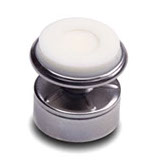 Floor Saver Base Glide
Floor Saver Base Glide
The Floor Saver Glide base provides a unique alternative to conventional base glides.
The unique patented shape of the Floor Saver Glide base pushes dirt and sand out of the path of the glide as opposed to standard glide bases which run over the dirt and grind the dirt into the tile. By moving less dirt under the base, under the load of the chair, the Floor Saver Glide base is much easier on VCT tile floors. This translates into less floor damage and reduces the need for costly maintenance. While floor maintenance is always important, floors with the Floor Saver Glide base furniture will not require as much maintenance as floors with conventional base furniture. This reduced need for floor maintenance will keep your floors looking better and for less money. By using the Floor Saver Glide you can prevent costly and unattractive scratching and marring caused by typical school chair glides on VCT tile school floors. The Floor Saver Glide is for use on smooth floor surfaces such as VCT or VAT tile.
back to top
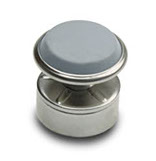 Elastomer/Rubber Base Glide
Elastomer/Rubber Base Glide
The most innovative glide solution is one made of elastomer/rubber/TPR. This class of materials is a relatively soft rubbery plastic which provides a sticky, non-skid base for the chairs. School chairs with these types of bases do not slide very easily across the floor. For students to move their chairs, the elastomer base glide causes the student to have to lift his/her chair in order to reposition the chair. This prevents the chairs from sliding across the floor with any force or frequency which reduces floor damage from scratching and marring and also reduces the annoying noise of chairs sliding across the floor. This material is surprisingly durable, though not as durable as nylon or steel base glides, and is often much more expensive.
back to top

